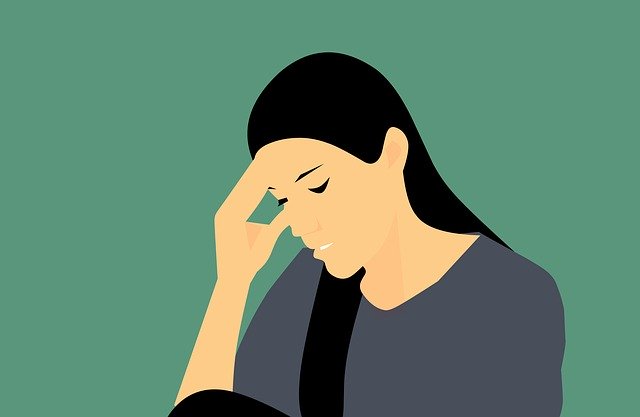Table of Contents
What are Physical Symptoms of Anxiety?
Often times when we talk about anxiety, we talk about the mental symptoms we experience such as feeling worried, scared, nervous, or dissociating. These are our thoughts and feelings, and they’re completely valid and real.
But we tend to neglect the physical symptoms of anxiety which can actually be really severe and impairing. The most common symptoms are a racing heart, shortness of breath, shaking, numbness, and much more.
And while these are definitely accurate for most people, there are a lot of other physical symptoms of anxiety that often get overlooked or unnoticed.
This list goes over some of these symptoms, why they may be happening, and how you can fix it. Let’s jump in!
*This post may contain affiliate links. By using the links on this article, I get a small amount of commission that I put back into my blog and Youtube channel. This does not compromise my integrity and I only recommend things I actually believe in or find of good quality*
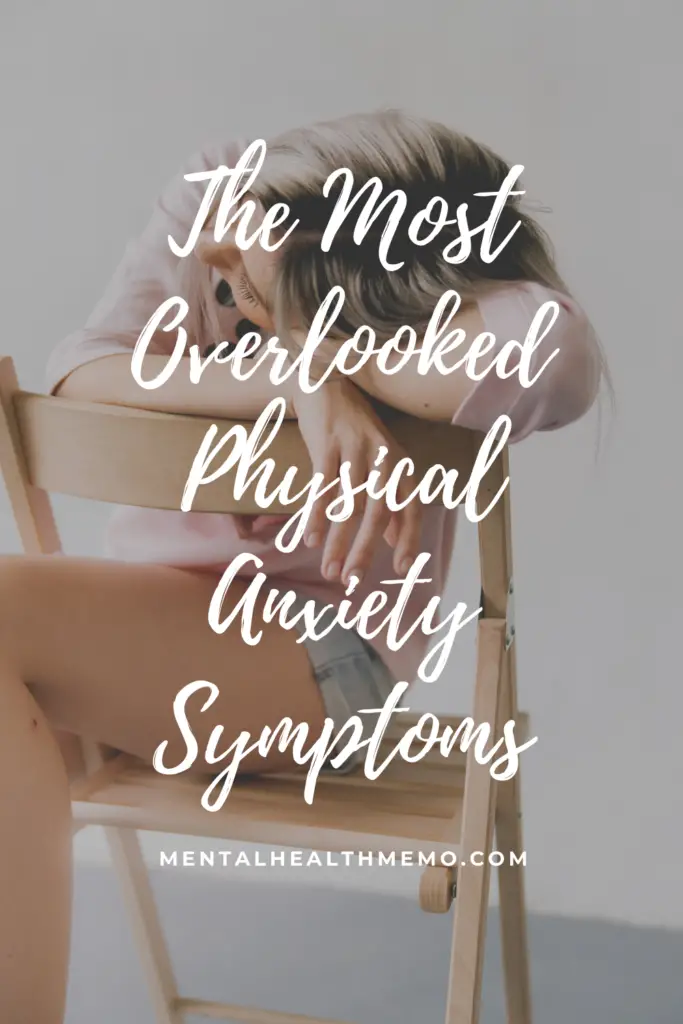
1. Stress Sweat 24/7
I know this might be awkward for some people to talk about and it even used to be weird for me too. But it’s something I think we should discuss because I’m sure there are lots of anxious people out there feeling ashamed about sweating all the time.
So yes, one of the first physical symptoms of anxiety is stress sweating all the time.
As I’ve mentioned before I’ve been anxious since I was a child. And obviously it’s really weird for an 8-year-old to be super sweaty all the time considering they haven’t yet gone through puberty.
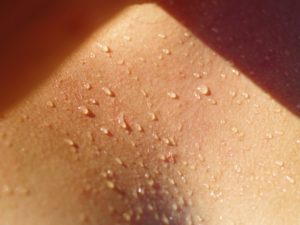
So being sweaty all the time was something I’ve been self-conscious of since I was little and I thought it was something physical for a long time.
But after trying out different products for over-sweating and learning about anxiety over the years, I’ve realized it’s my anxiety that makes me sweat so much.
And it makes sense. Think about when you have a big presentation to make at work, or a deadline creeping up, or even a first date. Usually, your heart is racing, you might have a stomachache and… you’re sweating. That’s because you’re anxious!
But if you feel anxious all of the time then well… you’re going to be sweating all the time too!
This is a really frustrating symptom to have because it can really affect your self-confidence as well as cost you lots of money (water from showering all the time, new clothes, etc).
If this sounds like you, here are some tips to help you with the sweatiness are:
- Shower often
- Use an antiperspirant instead of deodorant because antiperspirants help to stop sweat vs make it smell nice (what deodorant does)
- Wear cotton clothes- it’s a more breathable fabric
- Keep wet wipes and a mini antiperspirant in your bag in case you start sweating a lot
- Use a good quality perfume so you smell nice even if you’re sweating
- If you really sweat a lot, keep an extra pair of clothes in your bag, locker or car
- Try wearing layers so you can add and take off clothes as needed
- If you’re noticing something is making you super anxious, try meditating to cool down your mind and your body
- If you notice you’re sweating a lot, try to wipe the sweat off with a napkin as soon as you can
I personally use this clinical antiperspirant treatment to help myself sweat less. This is not a typical antiperspirant that you wear throughout the day, but rather a treatment that you put on at night to prevent you from sweating the next day.
It does work great and when I use it frequently I have completely dry pits! The way I use it is, if I haven’t used it for a while I use it every night for a week straight and then every few days the weeks after.
The only downside is that it can sting and irritate the skin so you have to make sure to not shave when using it, and not put on too much. It also makes me super itchy sometimes.
However, I’d prefer some itchy, hairy pits over soaking wet ones. So if you want to give this a try, click on the image to get it!
2. Using the washroom frequently
Another of the overlooked physical symptoms of anxiety is having to use the bathroom often. Yes, both #1 and #2.
The reason this may be is the fight or flight response. The fight or flight response is a survival response humans have that helps them to figure out if they should stay and fight or flee from danger.
In our ancestral days, this would look like seeing a wild animal, getting scared, and your mind and body deciding if you should fight it or run for your life.
This fight or flight response is actually at the core of a panic attack and thus in a sense, anxiety. The reason I bring the fight or flight response up is that when we choose to flee, our bodies make us remove all fluid and food from our bodies to help us run faster.
This is why if you’re having a panic attack, you probably need to pass a bowel movement and urinate a lot. You may also feel that way when you’re generally anxious or nervous.
This is a potential reason why anxious folks need to use the washroom so much.
Some tips for having to use the washroom are:
- Always use the washroom before you leave a building
- Be mindful of drinking lots of water where there’s no washroom
- Make sure you know where washrooms are in the building you’re in
3. Fatigue
I don’t think we talk about fatigue enough in reference to anxiety. Imagine feeling the way you feel before having to do something anxiety-inducing all day long, every day.
Then imagine having panic attacks on top of that. Experiencing anxiety and especially having panic attacks often is absolutely exhausting.
When I have a really bad panic attack, I tend to pass out afterward for up to 16 hours because my body and mind are absolutely drained.
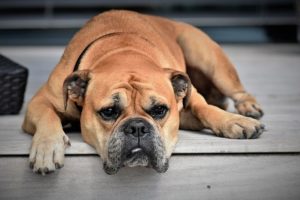
Being stressed, anxious, nervous, panicky takes a huge toll on your energy.
Tips for managing with this are:
- Avoid caffeine, energy drinks and sugar (to prevent energy crashes)
- Have a diet that includes energy-boosting foods (proteins, complex carbs, natural electrolytes)
- Having a healthy sleeping schedule
If you’re having a hard time sleeping, I would recommend a few things:
- Only use your bed for sleep and sexual intercourse – it trains your mind to understand that when you’re on the bed it means it’s time for you to sleep
- Try going to bed and waking up at around the same time every day
- Keep your room dark- light can activate the receptors on our eyelids that wake us up
- Keep your room cool and quiet- heat and auditory sounds can distract us and wake us up
- Try not to eat or drink before bed to prevent waking up during the night
4. Always getting sick
One undiscussed physical symptom of anxiety is always getting sick. As we’ve just discussed anxiety takes a giant toll on your body in lots of ways.
This inevitably picks away at your immune system which makes you prone to getting sick all the time. If you pair this with poor genetics and a poor lifestyle, it’s a recipe for disaster.
That’s why it’s super important to try and boost your immune system as much as you can to help yourself out. You can do this by:
- Visiting your doctor to ensure you’re getting all the nutrients you need by doing blood work or other required tests
- Taking multivitamins and multiminerals to help support your immune system
- Having a healthy sleeping schedule
- Eating balanced nutrient-packed meals
- Exercising
- Practicing self-care
- Taking time to relax and rejuvenate yourself through whatever means you find fit
5. Stomachaches
The last undiscussed physical symptom of anxiety I want to go over is stomachaches.
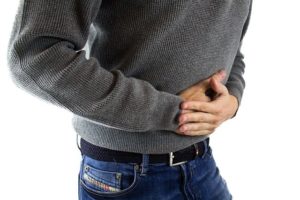
We’ve all felt our stomachs tighten when we get nervous. Like all the previous physical symptoms, instead of this happening once in a while it’s happening all the time.
This is why stomachaches and sensitive stomachs are common physical symptoms of anxiety affected individuals.
If you struggle with stomachaches because of your anxiety, here are some tips:
- Try to figure out if you have any trigger foods that upset your stomach even more (mine are spicy food, dairy, and things that are super oily)
- Eat as clean and wholesome as you possibly can
- Have food in smaller portions as to not overstuff yourself and hurt your stomach more
- Keep stomach medicine with you at all times in case you have an emergency
- Drink water to help flush out your body
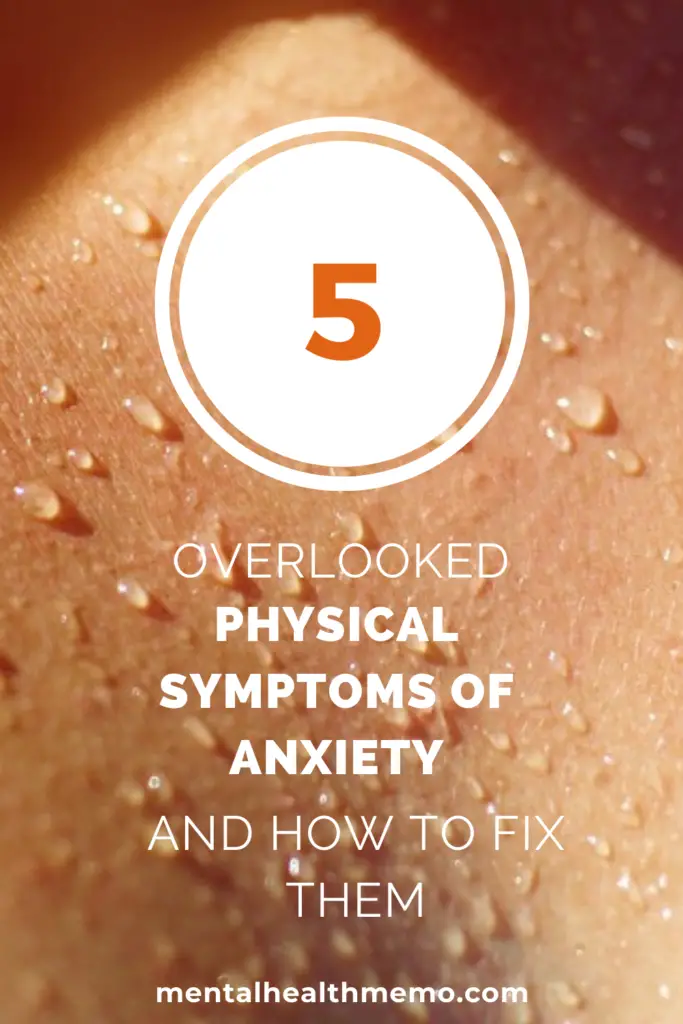
And that’s it! There are 5 often undiscussed physical symptoms of anxiety. I hope you have maybe connected some dots about your physical health and your mental health, and have also discovered ways to improve these physical symptoms of anxiety.
All my love,
T

